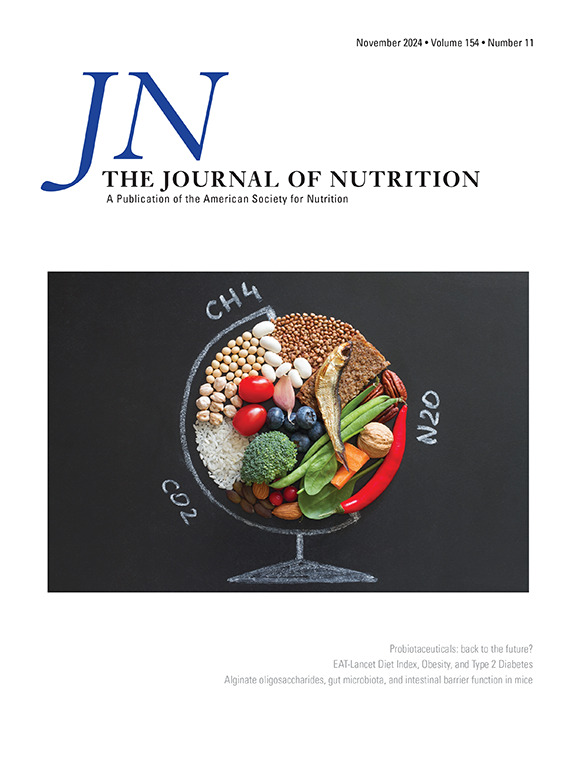Plant-Based Diets and Cardiovascular Events: A Proteomics Approach to Examine the Underlying Pathways
IF 3.7
3区 医学
Q2 NUTRITION & DIETETICS
引用次数: 0
Abstract
Background
Plant-based diets are associated with a lower risk of cardiovascular disease (CVD). Proteomics may improve our understanding of the biological pathways underlying these associations.
Objectives
Using large-scale proteomics, we aimed to examine if plant-based diet-related proteins, which have been previously identified, are associated with incident CVD and subtypes of CVD in the Atherosclerosis Risk in Communities (ARIC) Study and Framingham Heart Study (FHS) Offspring cohort.
Methods
Discovery analyses were based on 9078 participants free of CVD at ARIC visit 3 (1993–1995). Cox proportional hazards regression was used to evaluate the associations between plant-based diet-related proteins and incident CVD, coronary artery disease, heart failure, and stroke. Replication analyses were based on 1279 participants without CVD in the FHS Offspring cohort.
Results
In the ARIC study, over a median follow-up of 21 y, there were 3167 CVD events. At a false discovery rate <0.05, 26 of 73 plant-based diet-related proteins were significantly associated with incident CVD, after adjusting for important confounders. Eighteen, 1, and 0 proteins were associated with heart failure, stroke, and coronary artery disease, respectively. Three and 2 additional proteins were associated with CVD and heart failure risk in the FHS Offspring cohort at the nominal threshold (P < 0.05). In the ARIC Study and FHS Offspring cohort, soluble advanced glycosylation end product-specific receptor was inversely associated with incident CVD whereas thrombospondin-2 (THBS2) and N-terminal pro-BNP was positively associated with incident CVD. THBS2 was positively associated with incident heart failure, whereas neuronal growth factor regulator 1 and insulin-like growth factor-binding protein 1 was inversely associated.
Conclusions
These proteins highlight several pathways that could explain plant-based diets–CVD associations.
植物性饮食和心血管事件:一种蛋白质组学方法来检查潜在的途径。
背景:植物性饮食与较低的心血管疾病(CVD)风险相关。蛋白质组学可以提高我们对这些关联背后的生物学途径的理解。目的:利用大规模蛋白质组学,我们旨在研究在社区动脉粥样硬化风险研究(ARIC)和弗雷明汉心脏研究(FHS)后代队列中,先前已确定的植物性饮食相关蛋白是否与CVD事件和CVD亚型相关。方法:发现分析基于ARIC第3次访问(1993-1995)9078名无心血管疾病的参与者。Cox比例风险回归用于评估植物性饮食相关蛋白与心血管疾病、冠状动脉疾病、心力衰竭和中风之间的关系。复制分析基于FHS后代队列中1279名无心血管疾病的参与者。结果:在ARIC研究中,在21年的中位随访中,发生了3167例CVD事件。结论:这些蛋白质强调了几种可以解释植物性饮食与心血管疾病关联的途径。
本文章由计算机程序翻译,如有差异,请以英文原文为准。
求助全文
约1分钟内获得全文
求助全文
来源期刊

Journal of Nutrition
医学-营养学
CiteScore
7.60
自引率
4.80%
发文量
260
审稿时长
39 days
期刊介绍:
The Journal of Nutrition (JN/J Nutr) publishes peer-reviewed original research papers covering all aspects of experimental nutrition in humans and other animal species; special articles such as reviews and biographies of prominent nutrition scientists; and issues, opinions, and commentaries on controversial issues in nutrition. Supplements are frequently published to provide extended discussion of topics of special interest.
 求助内容:
求助内容: 应助结果提醒方式:
应助结果提醒方式:


